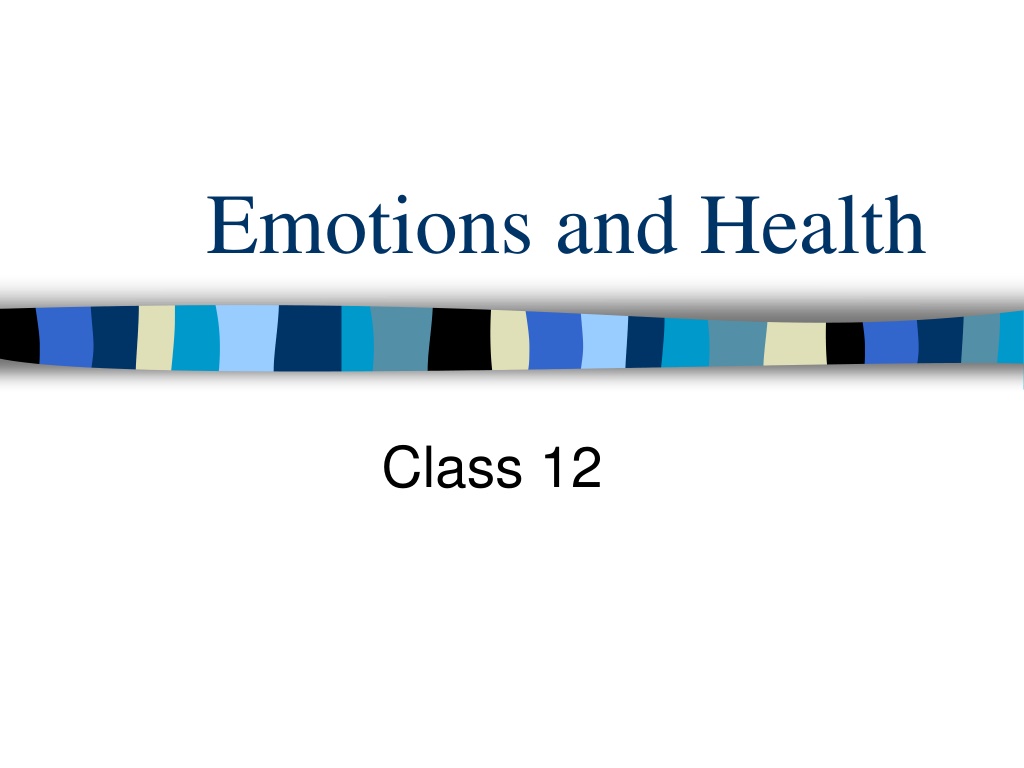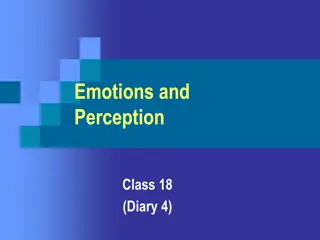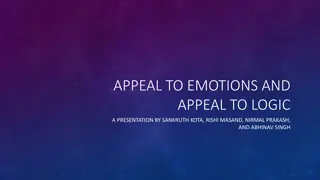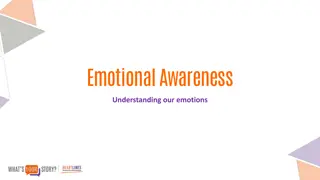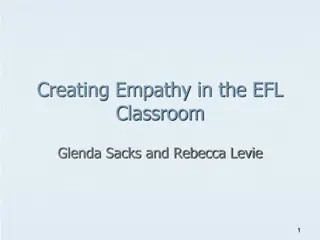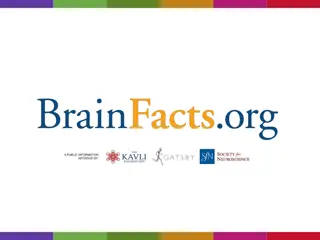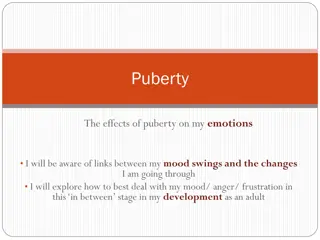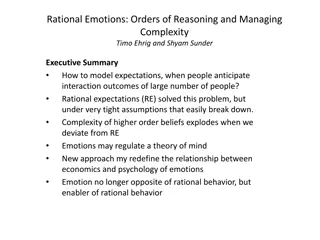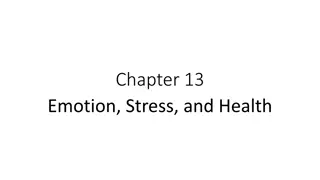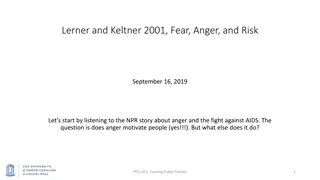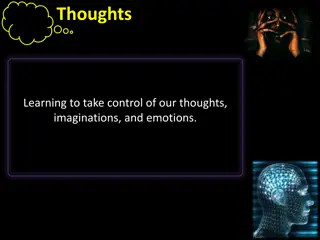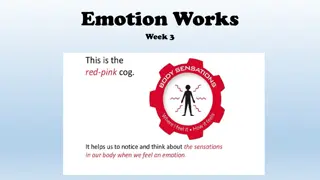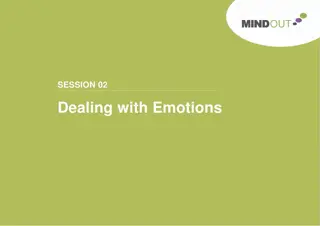Understanding the Connection Between Emotions and Health in Class 12
Explore the link between emotions and health in Class 12, covering topics from emotions and reasoning to folk wisdom about moods and health. Discover insights into how mood influences immunocompetence and the correlations between mood and various health conditions. Dive into research on the impact of different emotions on health outcomes, including studies on viral exposure, mood states, and illness rates.
Download Presentation

Please find below an Image/Link to download the presentation.
The content on the website is provided AS IS for your information and personal use only. It may not be sold, licensed, or shared on other websites without obtaining consent from the author. Download presentation by click this link. If you encounter any issues during the download, it is possible that the publisher has removed the file from their server.
E N D
Presentation Transcript
Emotions and Health Class 12
Midterm March 9 Midterm will cover everything from Class 1 (Introduction) up to and including Class 15 (Emotions and Reasoning II). Format: 50 multiple choice + 4 extra credit multiple choice. Duration: 100 minutes; entire class period.
Review Question 1 The chemical that Oliver Sacks used to awaken patients with sleeping sickness was: ___ Acetylcholine ___ Adrenaline ___ Dopamine ___ CCK ___ All of the above X
Review Question 2 After receiving a nasal spray of oxytocin, subjects were more likely to focus on another person s: ___ Hand gestures ___ Tone of voice ___ Body posture ___ Eyes and mouth ___ All the above X
Folk Wisdom About Emotions and Health King Solomon: A merry heart doeth good like medicine Proverbs, 17:22 Hippocrates: Humors, personality, mood states, health Blood = Sanguine = hearty, happy Black Bile = Melancholic = Sad Yellow Bile = Choleric = Grumpy, Hostile Phlegm = Phlegmatic = Apathetic Moods and Health arose from imbalance of Humours. Cure? Norman Cousins: Heals self with laughing cure for supposedly incurable connective bone tissue disease.
Correlations Between Mood and Health Depression co-occurs with illness Medical inpatients report mood/anxiety disorders Access to psychologists reduces MD visits What do these correlations suggest?
Immunocompetence Effectiveness of the immune system; ability to ward off illness, infection, etc. Measured by immune substances, quickness of arousal. T Cells, Natural Killer Cells, Immunoglobulin A (S-IgA) Moods are associated with immunocompetence Pos mood increases Immunoglobulin A (S-IgA) Neg mood decreases S-IgA
Immunocompetence and Mood Cohen, et al. (1995): Exposure to virus, mood state, and illness * Ss report mood, then inhale cold virus or placebo * Worse moods higher illness rate after cold virus. Labott, et al. (1990): Manipulated moods immune levels * Ss watch sad or funny movie * Higher S-IgA for funny movie, lower for sad movie Stone, et al. (1994): Frequency of desirable events and onset of respiratory illness. Stone, et al. (1996): Frequency of pos. events and immune levels
Emotional Management Responding to events with humor vs. crying. Expressing or suppressing emotions Using healthy or unhealthy behaviors to regulate moods Behaviors that alter mood, but are harmful: Drinks, smokes, drugs, eats, thrill-seeking, unsafe sex Behaviors that alter mood, but are helpful: Exercise, socialize, disclosure
Depression: The High Cost of Being Low 1. 15% of all people suffer depression 2. Chronic depression --> brain damage * Poorer Memory * Failed concentration X 3. ____ Men ____ Women 2 X more likely to get depressed.
Hypercortisolemia and Hippocampus Damage Hippocampus functions include: a. Long term memory b. Spatial navigation Hippocampus in depressed women smaller than in non-depressed women. Rats given cortisol show atrophied hippocampus. Depression --> increased cortisol (cortisolemia). What does this add up to? hippocampus atrophy Depression --> ___________ --> _____________-->______________ cortisolemia memory loss
Hostility Defined Hostility is considered to be an attitudinal set perhaps a personality trait which stems from an absence of trust in the basic goodness of others and centers around the belief that others are generally mean, selfish, and undependable. Williams, Barefoot, & Shekelle, 1985
Hostility Scale Sample Items (Cook and Medley, 1954) YES NO 1 No one cares much what happens to you 2 I have often met people who were supposed to be experts who were no better than I. 3 Some of my family have habits that bother and annoy me very much. 4 I often have to take orders from someone who did not know as much as I did. 5 It makes me feel like a failure when I hear of the success of someone I know well. 6 People often disappoint me. 7 It is safer to trust nobody. 8 I have often felt that strangers were looking at me critically. 9 I tend to be on my guard with people who are somewhat more friendly than I expected. 10 My way of doing things is apt to be misunderstood by others.
Hostile Personality and Health Hostile Personality IS NOT: Angry all the time Aggressive all the time Hostile Personality IS: Way of perceiving the world * Distrustful * Cynical Highly stable trait: Correlation over 4 yrs, r = .84 * Suspicious * Vigilant Men Which gender is more prone to Hostile Personality?
Case Study of Hostile Personality https://www.youtube.com/watch?v=_n77eoOfRPE
Health Correlates of Hostility Blockage of blood vessels Coronary Heart Disease (CHD): 1.5 time greater odds 20-year increased risk of death due to: * Coronary Heart Disease * Malignant Neoplasms (cancer) * All causes of death combined
Is Relation Between Hostility and Heart Disease Linear or Catastrophic? 10 10 9 9 8 8 7 7 Heart Disease Heart Disease 6 6 5 5 4 4 3 3 2 2 1 1 0 0 None Very Little Little Moderate Mod Plus A Lot A Great Degree None Very Little Little Moderate Mod Plus A Lot A Great Degree Hostility Score Hostility Score Linear Catastrophic
Hostility and Coronary Heart Disease Among MDs Barefoot, et al., 1983 15 13 11 CHD Events 9 7 5 3 1 -1 0 TO 8 9 TO 13 14 TO 17 18 TO 31 Hostility Score
MD Survival Rates Post Heart Attack Over 25 Years Low Hostile vs. High Hostile 0.99 0.97 Percent Surviving 0.95 Low Hostile High Hostile 0.93 0.91 0.89 0.87 0.85 1960- 1965- 1970- 1975- 1980-
Pathway From Hostility to Heart Disease Hostile Personality Increased Vigilance for Threat Appraisal of threat higher Defensive mode (fight) More cardiac output Increased cortisol Atherosclerosis NOTE: Cortisol is key player in stress Illness
Informational Value of Emotions to Health Mood affects recognition / interpretation of own symptoms Pos mood attn. outward less focused on symptoms Neg mood attn. inward more focus on symptoms Symptoms Reported Gendola et al., 2005
Happiness as a Health Risk Happiness leads to: Stronger immune system Fewer illness Less risk hypercortisolemia, memory Less hostility, cardio health Less hyperfocus on symptoms Happiness as Health Benefit Happiness as Health Risk Illusion of Invulnerability More health-promoting behaviors Blind to danger signs Willing to risk upsetting diagnoses Less defensive about hearing health risk information
Psychoneuroimmunology and AIDS Psychoneuroimmunology: New inter-disciplinary area that looks at how psychological states affect the body s resistance to illness AIDS: Acquired Immune Deficiency Syndrome HIV: Human Immunodeficiency Virus. The virus that causes AIDS.
Psycho-social Aspects of AIDS Why do some people who get HIV infections acquire AIDS sooner than do others? (Cole, 2000). 1. Sample: Gay men who acquired HIV at about the same time. 2. Looks at whether disclosed or hid gay identity, HIV status Hiders Who is more likely to become symptomatic, "hiders" or "disclosers"? Why is this so?
Why Do In Closet Gays Develop AIDS Sooner? B. (AIDS) A. (Hide Gay Identity) Is it that suppressing was itself a stressor, stress illness, therefore suppressing leads to quicker AIDS onset? NO
Why Do In Closet Gays Develop AIDS Sooner? B. (AIDS) A. (Hide Gay Identity) C. Sensitizer Is it that suppressing was itself a stressor, stress illness, therefore suppressing leads to quicker AIDS onset? NO Suppressors tend to be sensitizers , easily disturbed by any kind of event, especially social events. NOTE: THIS LINKS TO "TEMPERAMENT"
How Stress Hastens AIDS Onset 1. T cells important immuno-agent 2. T Cells sprout molecular hand holds , like Velcro, at times. 3. HIV uses these hand-holds to attack T cells. 4. Researchers artificially induce hand-holds by using harsh laboratory chemicals. 5. Cole asks: What kinds of natural chemicals have same effect? 6. Clues: * AIDS faster among stressed vs. non-stressed * Stress releases nor-epinephrine (nor-epi) 7. Finds: Exposing healthy T cells to nor-epi more hand-holds. 8. Gay sensitizers more susceptible to stress More nor-epi T-Cells more susceptible to HIV increased AIDS
Full Circle: From Hippocrates to Kagan to AIDS Hippocrates: Body type (humours) affect moods affect health. Kagan: Temperament shy versus outgoing Stress cortisolemia illness Cole: Gay HIV + who are sensitizers (shy as kids?) more susceptible to stress, more likely to develop AIDS.
